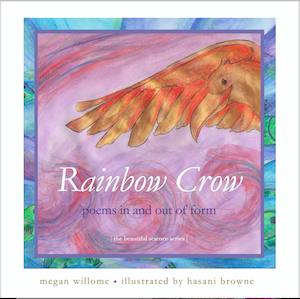The Secret of Life
Too many readers and too many teachers approach a poem wanting to know its secret. Solve for X. Explain the mystery as if it were a whodunnit. Denise Levertov’s poem “The Secret” plays with that whole idea.
When Levertov was 12 years old, she sent some of her poems to T.S. Eliot, who wrote her back a two-page letter, typed. Levertov was born in England and worked in London as a nurse, but came to the United States when she married an American. She was the kind of poet who worked right up to her death — writing, editing, teaching, occasionally being jailed for political protest — but she was not showered with awards. Her reputation has grown quietly. To the casual poetry reader, her name is a secret.
My first step in memorizing “The Secret” was to play with the poem’s line breaks.
Normally I let line breaks inform me about how a poem should be read. But when I tried to read this poem with those pauses, my memorization muscles wouldn’t work. In my head, it looks like prose sentences.
Here’s what the actual poem looks like:
The Secret
Two girls discover
the secret of life
in a sudden line of
poetry.
I who don’t know the
secret wrote
the line. They
told me
(through a third person)
they had found it
but not what it was
not even
what line it was. No doubt
by now, more than a week
later, they have forgotten
the secret,
the line, the name of
the poem. I love them
for finding what
I can’t find,
and for loving me
for the line I wrote,
and for forgetting it
so that
a thousand times, till death
finds them, they may
discover it again, in other
lines
in other
happenings. And for
wanting to know it,
for
assuming there is
such a secret, yes,
for that
most of all.
– Denise Levertov
And here’s how I wrote it down to learn it By Heart, alternating the spacing to show who is receiving the emphasis.
Two girls discover the secret of life in a sudden line of poetry.
I who don’t know the secret wrote the line.
They told me (through a third person) they had found it but not what it was not even what line it was.
No doubt by now, more than a week later, they have forgotten the secret, the line, the name of the poem.
I love them for finding what I can’t find, and for loving me for the line I wrote, and for forgetting it so that a thousand times, till death finds them, they may discover it again, in other lines in other happenings.
And for wanting to know it, for assuming there is such a secret, yes, for that most of all.
Forgive me, Ms. Levertov. Even though I needed this crutch, I prefer the way you wrote it (cross my heart). Because each of your nine short stanzas looks like a secret.
The two girls whisper. The poet whispers. And the poem itself whispers to us, Yes, Megan, there is a secret.
And yet, although that’s what the poem says, it’s also not what the poem is saying. The speaker is amused with the two girls who discover the poem’s secret. The whole poem chuckles at the poet, who “wrote / the line,” but doesn’t know the secret. Even the phrase “secret of life” is kinda funny.
But the secret is real, nonetheless. The secret is not in the writing: It’s in the reading.
The secret of any poem is there for any and every reader “wanting to know it.” The secret may be treasured and cross-stitched into a pillow, and/or it may be forgotten “more than a week / later.”
If we read a poem “assuming that there is / such a secret, yes,” then it will whisper to us, suddenly.
Photo by C Watts, Creative Commons, via Flickr. Post by Megan Willome.
Browse more By Heart
“Megan Willome has captured the essence of crow in this delightful children’s collection. Not only do the poems introduce the reader to the unusual habits and nature of this bird, but also different forms of poetry as well.”
—Michelle Ortega, poet and children’s speech pathologist
- Perspective: The Two, The Only: Calvin and Hobbes - December 16, 2022
- Children’s Book Club: A Very Haunted Christmas - December 9, 2022
- By Heart: ‘The night is darkening round me’ by Emily Brontë - December 2, 2022


Leave a Reply